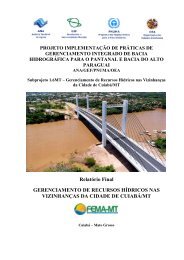Rt€@lll
Rt€@lll
Rt€@lll
You also want an ePaper? Increase the reach of your titles
YUMPU automatically turns print PDFs into web optimized ePapers that Google loves.
TI-E SOUTH PACIFIC REGIOT.IAL ENVIROT{MENT PROGRAMME<br />
Arthur Lyon Dahl<br />
B.P. 1146, Noumea, New Caledonia<br />
ABSTRACT<br />
Tfre South Paeif ic Regional Environnrent Programme groups 22 island<br />
countries and territories to deal with their comrnon environrnental problems. It is<br />
a joint programme of SPEC, SPC, t-tlEP and ESCAP, with a secretariat bmed at<br />
SPC and financial support from UNEP as part of its Regional Seas Programme.<br />
The first preparatory phase began in January 1980 with the preparation of<br />
country reports and expert reviews of important topics. These provided an<br />
indicaLion of governnnnt priorities and of the state of lhe environnent in the<br />
region, leading to the adoption of a Declaration and Action Plan a[ the<br />
Cmference m the Human Environrnent in the South Pacific in Rarotonga in Mareh<br />
L982. Priority areas of the Action Plan concerning legal rneasures, radioactivity,<br />
hazardous wasLe dumping, boxic chemicals, a network of pollution control centres,<br />
research m marine and coastal probbms, trsditional environmental knowledge and<br />
rnanagement, and environrnental information and training are now being actively<br />
implernented, and further projects are in preparation.<br />
Introduction<br />
Each Regional Seas prognam,ne area has its own distinctive characteristics. The Soth<br />
Pacific Regional Environment Programrne (SPREP) is unique in its origins and orientation, r<br />
is appropriate to a region consisting entirely of island states with well established regional<br />
organizations and traditions of co-operation. The earliest regional intergovernmenLal<br />
organizalion, the South Pacific Commission (SPC), is nearly es old as the United Nations,<br />
having been founded in 1947. In addition, the region has long been sensitive to environmental<br />
issues. The traditional island cultures have developed over generations within the constraints<br />
of their environment, and where resources were limited lhey generally evolved management<br />
strategies and controls to ensure that resource use was sustainable.<br />
The terrr "South Pacific" is not strictly accurate, as the region includes not only all<br />
the tropical SouLh Pacific Islands of Melanesia and Polynesia from P4ua New Guinea to<br />
Pitcairn, but also extends northward through the islands of Micronesia, most of which lie<br />
norlh of the equalor (see map at beginning of section). Tfn region covers about 29 million<br />
km-, almost seven times that of the Caribbean, which makes it by far the largegL Regional<br />
Seas programme in area. The land area, m the other hand, is mly 55lrttr0 km', of which<br />
Papua New Guinea makes up 84%. There are roughly I million inhabitants in Papua New<br />
Guinea, and 2 million in the other 2l countries of the region, ranging fcpm over 6001000 in<br />
Fiji to less than a hundred sr Pitcairn. Pqulation densities (persons/km') range from 6 or 7<br />
in Papua New Guinea and New Caledorria to 148 on Nauru. The GNP per capita of U5$ 1,775<br />
(in 1978) is considerably below that of the Caribbean (SPC, 1982).<br />
Orioins<br />
SPREP evolved out of a ciecade of regional environrnental interest and activity. As far<br />
back as 1970, the South Pacific Commission proposed recruiting an ecologist on its slaff, Bnd<br />
lhis was zupported by a resolu[ion frorn the Regional Symposium on Consenvation of Nature -<br />
Reefs and Lagoons, held in Noumea, New Caledonia in I97l under the joint sponsorship of<br />
SPC and the lnternational Union for Cmservation of Nature and Natural Resources (IUCN), a<br />
meeting which identified many environmental probbms of regional concern. The governnents



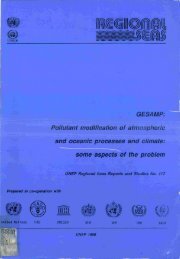
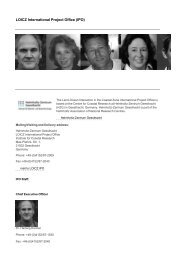
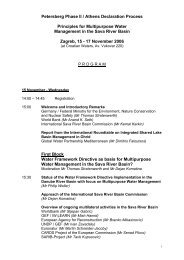
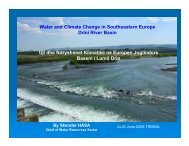
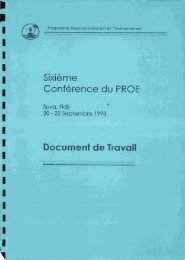
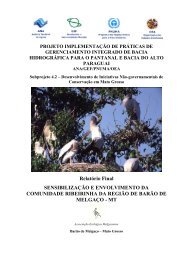
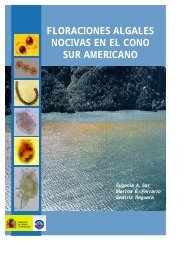
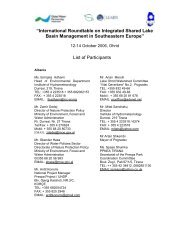
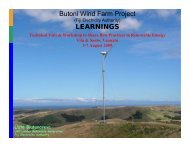
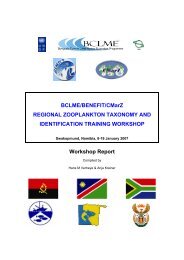
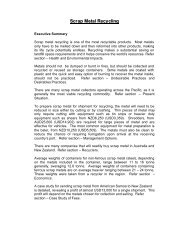
![R]€@lll](https://img.yumpu.com/7594335/1/175x260/reurlll.jpg?quality=85)
